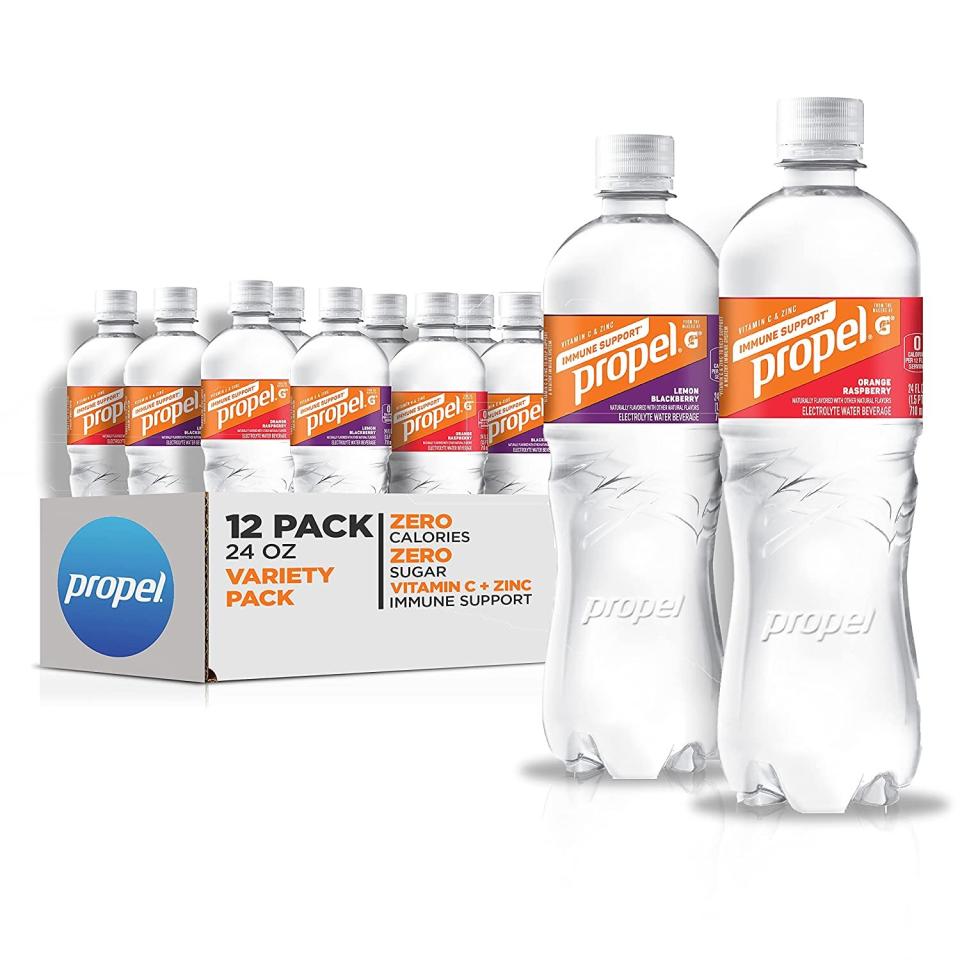Vitamin-Enhanced Drinks to Stay Hydrated and Score Key Nutrients
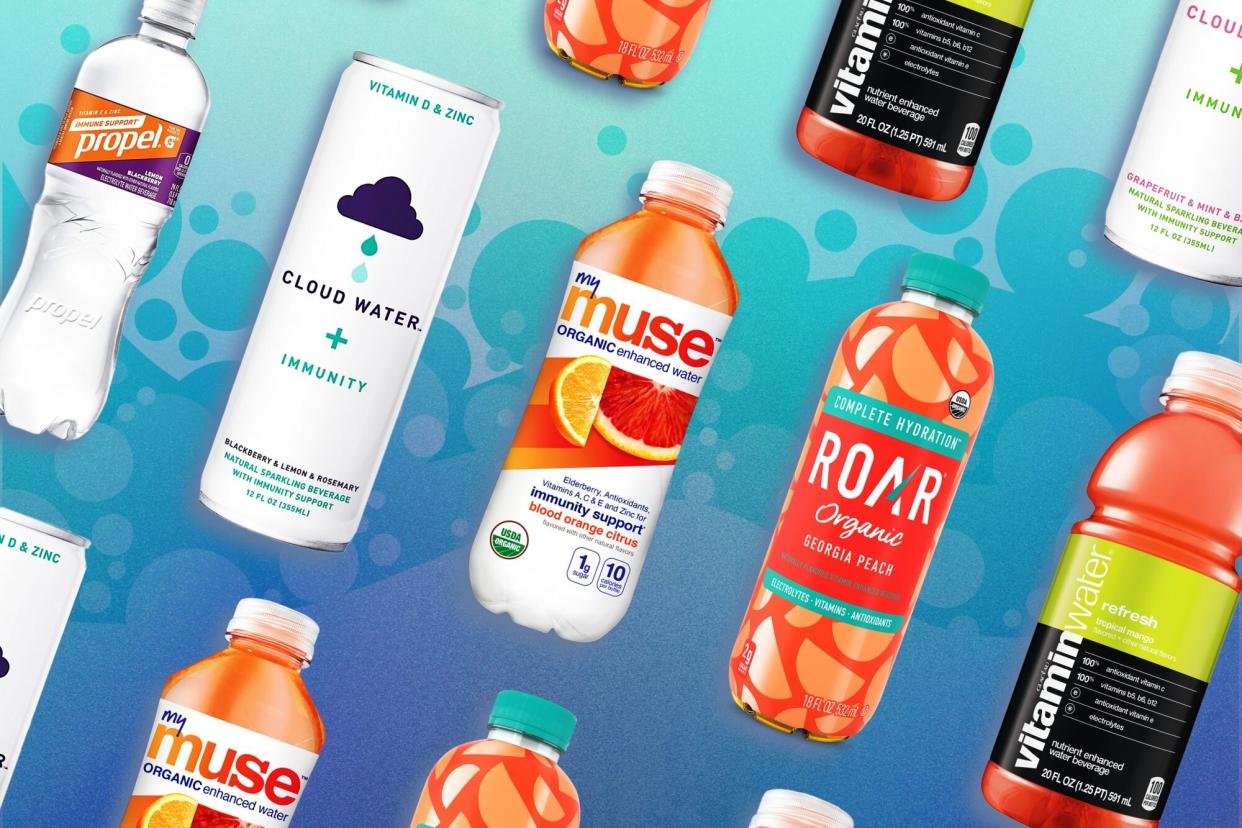
Courtesy of Merchants
Considering the widespread love for HIIT workouts, Instant Pots, and do-it-all skin-care products, it seems fair to say that most folks are obsessed with living their lives as efficiently as possible. So when you're hydrating, why not get two — the need to hit your fluid intake and the desire to score some nutrients — for the price of one?
Enter: Vitamin-enhanced drinks, which — just as their name implies — are beverages that have been mixed with refreshing flavors and powders containing vitamins (e.g. vitamins A, B, C, D, and E), and in some cases, minerals (e.g. magnesium or zinc), says Abby Chan, M.S., R.D.N., a registered dietitian nutritionist and the co-owner of EVOLVE Flagstaff in Arizona. "What's typically in them is a pretty small amount of actual vitamins…[so] you're not going to overdose yourself with vitamins, especially because all of these are typically water-soluble," says Chan. "If your body doesn't need them, you'll generally just end up peeing them out."
More specifically, water-soluble vitamins (e.g. vitamins C and B), don't build up in the cells and excess amounts can be excreted, while fat-soluble vitamins (e.g. vitamins A, D, E, and K) are stored in cells, don't pass through the body as easily, and have the potential to cause harm when consumed in excess, according to University of Michigan Health. But you don't have to worry about "overdosing" on those fat-soluble nutrients: Research on supplements shows you'd need to consume more than four times the recommended dietary allowance for vitamin A and more than three times that of vitamin D to potentially experience "toxic" side effects.
In general, sipping on vitamin drinks can help you stay hydrated throughout the day (women typically need to consume about 11.5 cups of fluid daily, according to the Mayo Clinic), and they don't come with any major health risks, says Chan. However, you may not experience a drink's supposed benefits unless you're deficient in the particular nutrient, she says. For example, some beverages infused with B vitamins — which help the body turn the food you eat into energy — are labeled as "energy-boosting" drinks, but you probably won't get a pick-me-up from that kind of vitamin water unless you're low on the vitamin, she explains. (Related: Could Vitamin Deficiencies Be Ruining Your Workout?)
More significantly, Chan says vitamin-enhanced drinks generally contain a high amount of added sugar, which can contribute to health problems such as type 2 diabetes and heart disease when consumed in excess, according to the Centers for Disease Control and Prevention (CDC). A bottle of vitaminwater's energy beverage, for instance, contains 27 grams of added sugar, accounting for 54 percent of the recommended daily allowance established by the U.S. Department of Agriculture (USDA). "Sugar isn't inherently bad by any means — there's definitely a time and a place for it," says Chan. "But...if this is your main source of taking in vitamins, it's going to be much better done through food, which is going to have a higher content of these vitamins as well as other nutrients, such as phytonutrients, antioxidants...protein, carbs, and all that" — without all the added cane sugar.
Some brands opt to blend their vitamin-enhanced drinks with sugar alcohols and artificial sweeteners, such as erythritol and Stevia, which don't impact blood sugar, says Chan. Still, some of these alternatives have been linked with gastrointestinal distress and discomfort, especially when consumed in large amounts. "They are also generally exponentially sweeter than typical sugar," she adds. "So that could maybe change your palate preferences so that when you are actually eating and consuming real sugar, you may want that same bang for your buck — that super, super sweetness." This could, in theory, lead to consuming more sugar to get the same result. (Related: Meet Allulose, the New Low-Calorie Sweetener That's Sweeping the Market)
To keep yourself hydrated without dealing with any of those potential downsides, Chan generally recommends sipping on straight-up, no-frills H2O the majority of the time. "But if it's something that really brings you joy, or if you really love a certain type of vitamin-infused beverage, great," says Chan. "Let's partake in that in a way that isn't all day, every day and replacing water consumption." That might mean keeping your consumption of these bevvies to a moderate level (read: not gulping down bottles upon bottles each day, maintaining your intake of no-sugar-added drinks (think: water, unsweetened tea, etc.), and remembering that vitamin-enhanced drinks aren't a "magic pill" that will help you hit your daily nutrient quotas, says Chan.
Still, if you are eating a nutrient-dense diet already and you want to jazz up your water intake while copping a few essential nutrients along the way, consider stocking your fridge with these vitamin drinks.
vitaminwater
Available in seven flavor varieties, vitaminwater is sure to have a beverage that meets your taste buds' unique preferences. Citrus lovers will want to sip on the energy vitamin drink, which boasts energy-providing vitamins B6, B5, and B12, immune system-supporting vitamin C, and caffeine to help you push through that mid-morning slump. And those who want a taste of the tropics may prefer the mango-flavored refresh variety, which offers those same nutrients along with vitamin E — an antioxidant that protects cells from the damaging effects of potentially harmful free radicals and helps your immune system function, according to the U.S. National Library of Medicine (NLM). That said, each bottle of vitaminwater (no matter the flavor) contains 26 to 27 grams of added sugar, accounting for more than half the recommended allowance for the ingredient, so you may want to keep an eye on how much you're sipping.
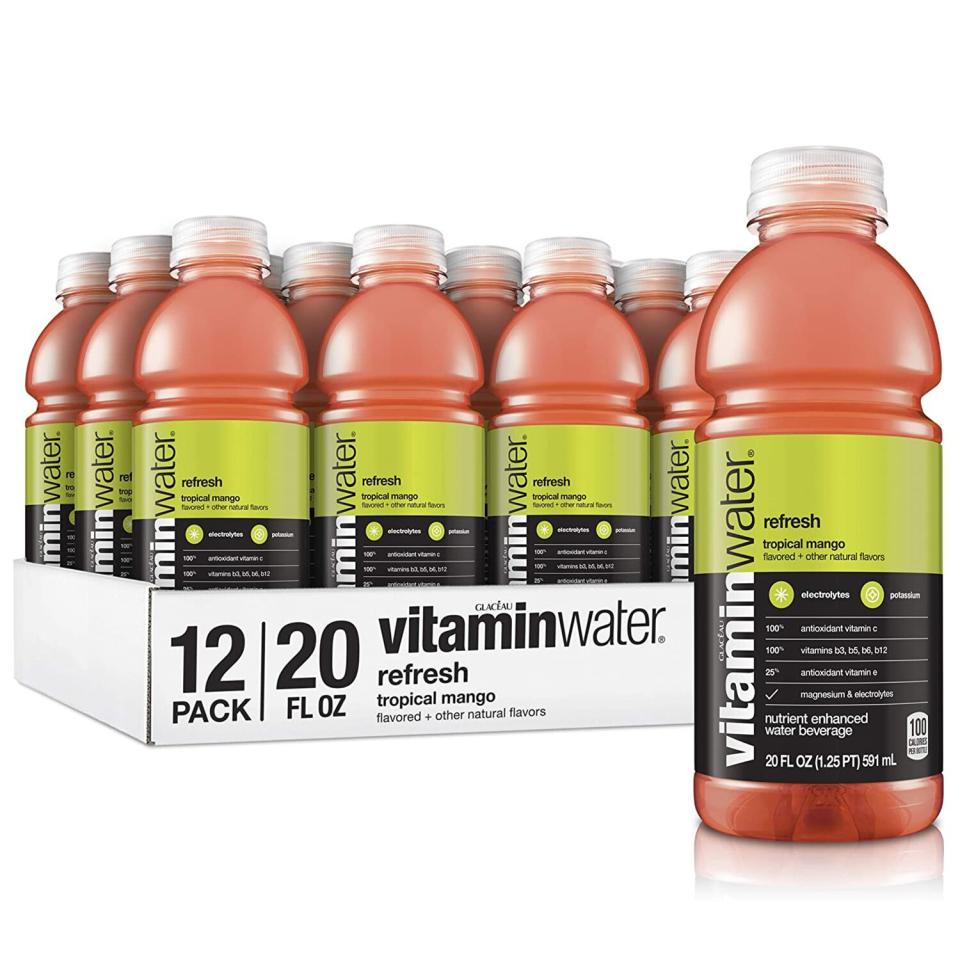
MyMuse Organic Enhanced Water
In each bottle of MyMuse's enhanced water, you'll quench your thirst with a combo of standard H2O and coconut water — the clear liquid found inside immature coconuts that's rich in the electrolytes potassium, sodium, and magnesium and may help you rehydrate after exercise, according to the NLM. Though coconut water lends a natural sweetness, this beverage in particular is also infused with erythritol, a calorie-free sugar alcohol that has a high digestive tolerance (meaning it's less likely to cause GI troubles), and Stevia, a zero-calorie sweetener that's reported to be 200 to 400 times sweeter than table sugar, according to the USDA.
Sweetness aside, all of the fruity varieties of the vitamin drink provide 10 percent of the RDA for vitamin E, nearly 13 percent of the RDA for vitamin A (which supports immune function and vision), and about 69 percent of the RDA for zinc (which plays a role in immune function and protein production). However, the Blood Orange Citrus and Peach Mango options also boast roughly 43 percent of the RDA for vitamin C, making the sips a potentially useful addition to your cold prevention toolkit. (Related: 7 Ways to Naturally Strengthen Your Immune System)
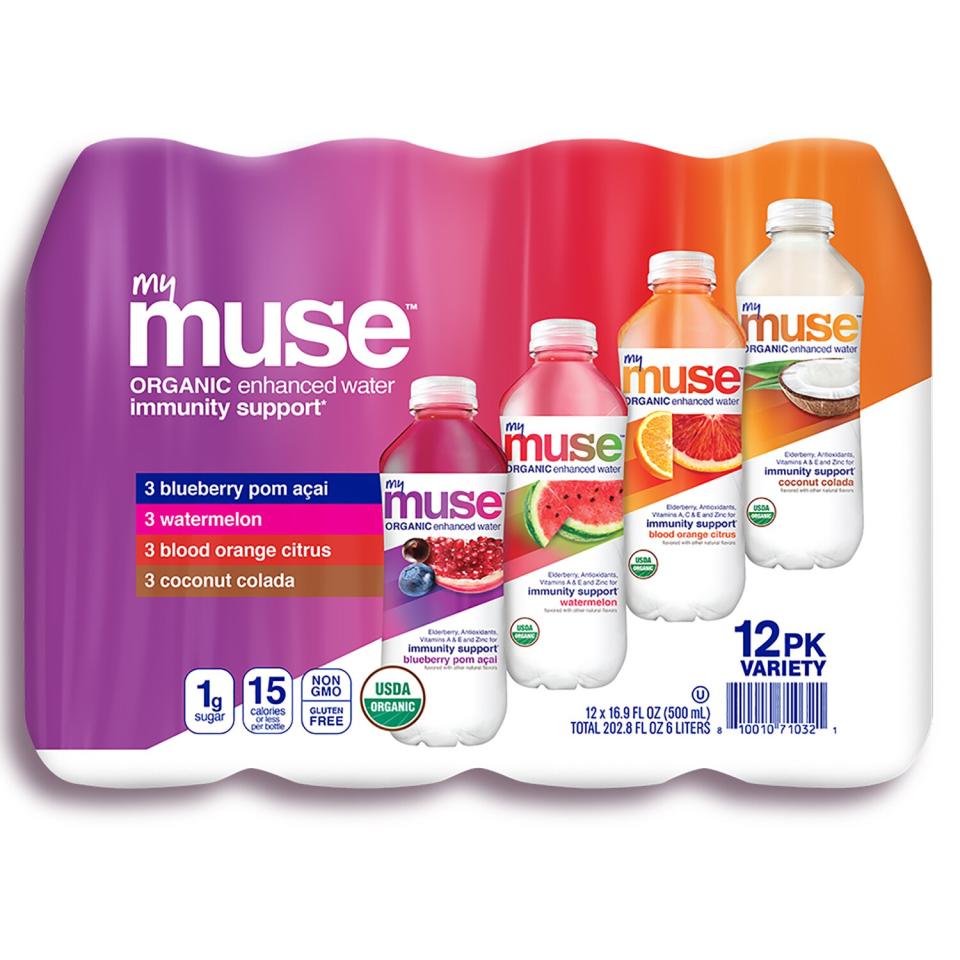
Cloud Water Organic Cloud Water + Immunity
Thanks to Cloud Water's canned format, sparkling nature, and cocktail-like flavors, non-drinkers won't feel left out while their friends sip on hard seltzer. The vitamin drinks — available in Blood Orange and Coconut, Grapefruit, Mint, and Basil, and Blackberry, Lemon, and Rosemary flavors — have a short and sweet ingredient list and are lightly sweetened with organic wildflower honey, equating to just 10 percent of the recommended allowance for added sugar. And in each can, you'll nab nearly 138 percent of the RDA for zinc and 114 percent of the RDA for vitamin D, a nutrient that helps your body absorb bone-strengthening calcium and your immune system fend off bacteria and viruses, according to the National Institutes of Health (NIH). (Related: The Best Canned, Non-Alcoholic Drinks)
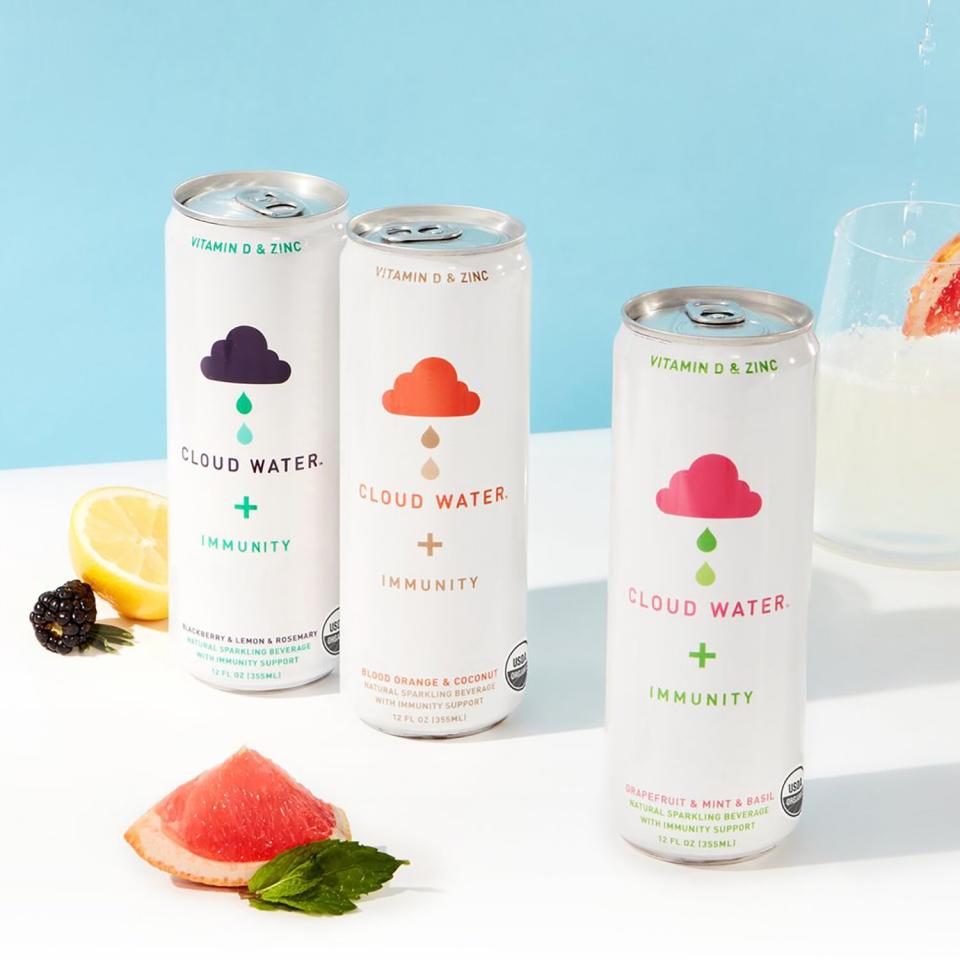
Roar Organic Vitamin-Enhanced Beverage
Similar to MyMuse's vitamin drink, Roar Organic's bevvie contains standard water and coconut water to hydrate, plus cane sugar, erythritol, and Stevia to sweeten. But the fruity-meets-refreshing drink — available in Blueberry Acai, Georgia Peach, Cucumber Watermelon, Mango Clementine — pack more nutrients per serving than its counterpart. In fact, you'll score 57 percent of the RDA for vitamin A, 53 percent of the RDA for vitamin C, and 47 percent of that for vitamin E, as well as energizing B vitamins. (Next up: The Best Healthy Sodas to Drink If You Hate Sparkling Water)
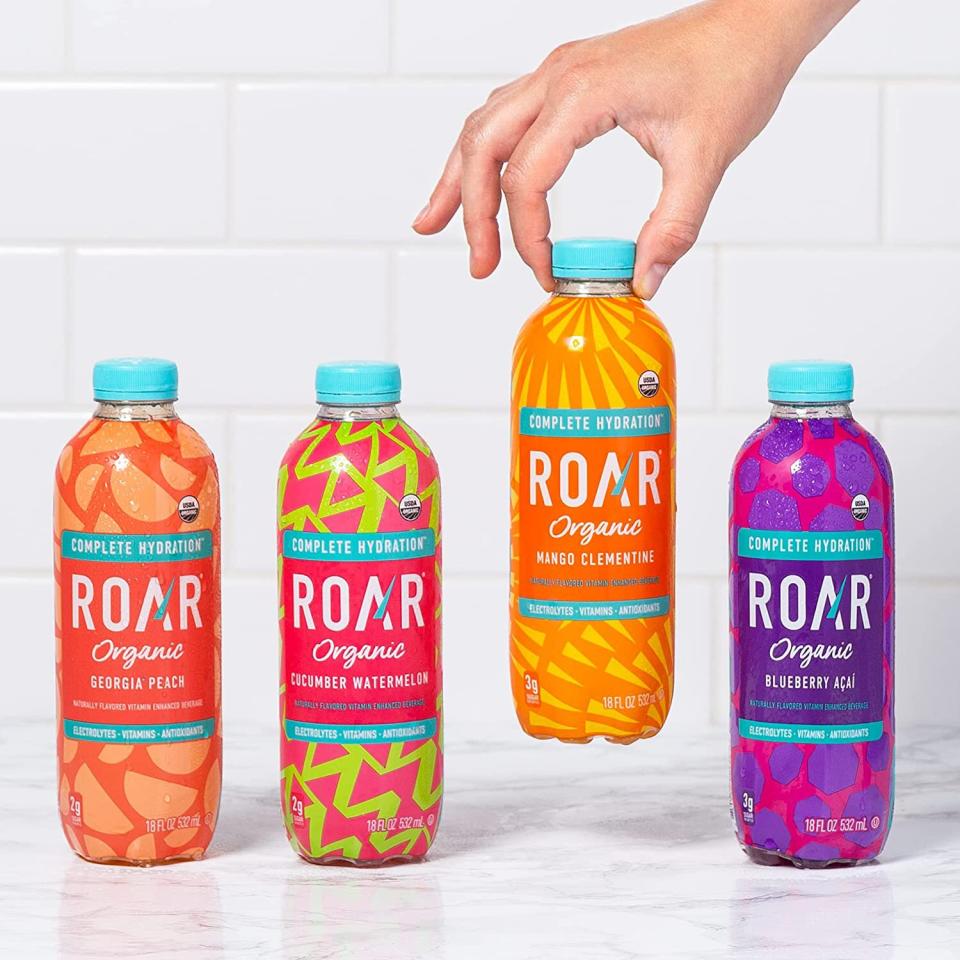
Propel Immune Support
If Mindy Kaling is a fan of Propel's vitamin drinks, you know they're worth adding to your fridge. The Lemon Blackberry- and Orange Raspberry-flavored beverages both contain 144 percent of the RDA for vitamin C, 20 percent of the RDA for vitamin E, 92 percent of the RDA for vitamin B6, and a few other nutrients. Though sugar substitutes aren't listed on its nutrition facts label, the vitamin-enhanced drinks are sweetened with Acesulfame Potassium (aka Ace-K) and sucralose (aka Splenda) — non-nutritive sweeteners (read: calorie-free) that are 200 and 600 times sweeter than table sugar, respectively, according to the Food and Drug Administration. Translation: It's sure to satisfy your sweet tooth. (These infused water recipes will help you stay hydrated without the sweeteners.)
